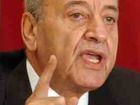Spotlight
-
 Lebanon
Cabinet approves banks financial gap law after long debate
Cabinet approved Friday a long-awaited banking draft bill that would distribute losses from the 2019 economic crisis.
Thirteen ministers voted...
2
Lebanon
Cabinet approves banks financial gap law after long debate
Cabinet approved Friday a long-awaited banking draft bill that would distribute losses from the 2019 economic crisis.
Thirteen ministers voted...
2
-
 Lebanon
Israel strikes Hermel, Bouslaiya in east and south Lebanon
The Israeli military announced a series of strikes on "Hezbollah targets" in south and east Lebanon on Friday, including "weapons depots" and a "tr...
1
Lebanon
Israel strikes Hermel, Bouslaiya in east and south Lebanon
The Israeli military announced a series of strikes on "Hezbollah targets" in south and east Lebanon on Friday, including "weapons depots" and a "tr...
1
The Lebanese Forces hailed Hizbullah leader Sayyed Hassan Nasrallah's position after he back-pedaled from adherence to a proportional representation system which the LF described as a “positive” step, al-Joumhouria daily reported on Thursday.
“Sayyed Hassan Nasrallah reconsidered his adherence to full proportional representation system which paves way for an agreement on a new electoral law,” LF sources told the daily on condition of anonymity.
 Full Story
Full Story
United Nations Special Coordinator for Lebanon Sigrid Kaag and European Union Ambassador to Lebanon Christina Lassen visited the Regional Mine Action Center (RMAC) in Nabatieh on May 3, a UN statement said.
The visit included a briefing by Brig. Gen. Ziad Nasr, Director of the Lebanon Mine Action Center, on progress made in the implementation of Lebanon’s National Mine Action Strategy, including in the clearing of mines, cluster munitions, unexploded ordnances and all explosive remnants of war.
 Full Story
Full Story
Progressive Socialist Party leader MP Walid Jumblat emphasized that he strongly rejects a cabinet vote on an electoral law and the “sectarian” qualification law format, asserting that Hizbullah leader Sayyed Hassan Nasrallah was right when he said that the country is on the verge of an abyss, ad-Diyar daily reported on Thursday.
Asked about a cabinet vote on an electoral law, Jumblat told the daily in an interview: “We have foiled an option on voting through an intercepting plan. Sayyed Nasrallah has asserted that the election law is very sensitive and can only be solved through consensus.
 Full Story
Full Story
Speaker Nabih Berri reiterated on Wednesday that an extension of the parliament's term is “absolutely impossible.”
Addressing lawmakers during his Wednesday meeting with deputies in Ain el-Tineh, he said: “Rest assured, I speak on behalf of the council. A parliament mandate extension is absolutely inconceivable.
 Full Story
Full Story
The Internal Security Forces arrested a man in the eastern town of Zahle who had sold his infant daughter in return for LL 1.8 million, an ISF statement said on Wednesday.
The mother of the child, R.S., filed a complaint at Zahle Judicial Unit claiming her husband, Lebanese Aa.H., have sold their one-year old daughter in return for 1.8 million Lebanese pounds.
 Full Story
Full Story
President Michel Aoun pointed out to the negative implications as the result of refugees influx into Lebanon, media reports said on Wednesday.
Aoun drew before his visitors to the negative repercussions of the number of displaced people in Lebanon and stressed that Lebanon wants a political solution to the Syrian crisis, said the reports.
 Full Story
Full Story
The Lebanese army arrested a number of wanted fugitives on Wednesday during raids it staged in the northeast Lebanon town of Hermel, the National News Agency reported.
The Airborne Regiment and elements of the Army Directorate of Intelligence staged the raids early Wednesday and arrested a number of fugitives some of whom were identified by their initials as N.H and M.H, NNA said.
 Full Story
Full Story
On the eve of a cabinet meeting set to discuss a draft electoral bill for Lebanon's parliamentary elections, things seem to be worsening in light of the absence of initiatives and deliberations between political parties mainly between the two Shiite parties (AMAL and Hizbullah) and the Free Patriotic Movement, al-Joumhouria daily reported Wednesday.
The latest effort made in that regard was a meeting between head of the FPM Foreign Minister Jebran Bassil, Lebanese Forces MP George Adwan, PM Saad Hariri's adviser Nader Hariri of al-Mustaqbal Movement, said the daily.
 Full Story
Full Story
Speaker Nabih Berri voiced a warning statement that the anticipated May 15 parliament session will not convene shall consensus between political parties fail on a new electoral law, al-Joumhouria daily reported on Wednesday.
“I don't agree on an extension (of the parliament term). If an agreement on a new law is not reached before May 15, the legislative session will not convene,” warned Berri.
 Full Story
Full Story
State Security agents on Tuesday managed to seize three machines for manufacturing Captagon narcotic pills in the eastern city of Baalbek, state-run National News Agency reported.
 Full Story
Full Story



